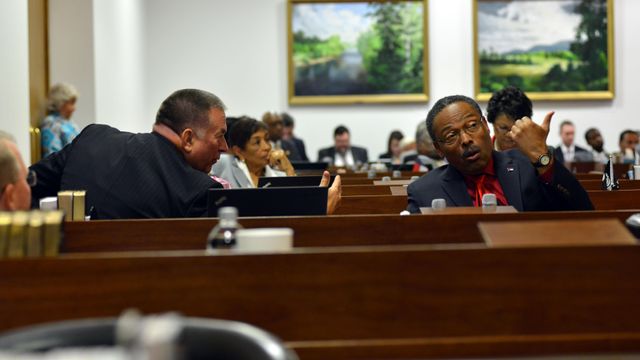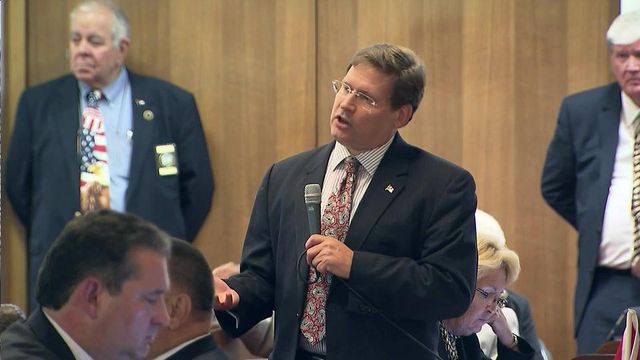House OKs $21.7B budget deal
House lawmakers voted Thursday night and early Friday morning to approve the $21.7 billion dollar spending compromise passed by the state Senate earlier this week.
Posted — UpdatedThe deal includes full but restricted funding for teaching assistants, a $750 bonus for state workers and teachers and money for raises for State Highway Patrol members and correctional officers, but no overall raise for teachers and state employees and no cost-of-living increase for state retirees.
It also includes a hefty tax cut and other changes to benefit corporations, a small decrease in the personal income tax rate in 2016, from 5.75 to 5.49 percent, and an expansion of the sales tax to include labor for repairs to real property – everything from homes and automobiles to clothing and shoes.
That added sales tax, which would take effect in March 2016, is expected to generate more than $225 million over the next two years – money which will be channeled to the state’s 79 rural counties to use for education or economic development.
The first of two bipartisan votes, 80-35, came around 10 p.m. Thursday, after more than four hours of sometimes testy debate. Nine Democrats, including Rep. Gale Adcock, D-Wake, voted for the bill, as did all House Republicans.
"I've certainly never seen two budgets further apart, and frankly, that was the big challenge we've had over the past weeks and months," said Senior Budget Chairman Rep. Nelson Dollar, joking that the state should consider adopting a unicameral legislature like Nebraska's.
Dollar, R-Wake, highlighted the spending plan's full funding for teacher assistants, funding for driver's education, additional money for courts and mental health in prisons and the new Department of Military and Veterans' Affairs created in the deal.
It also sets aside $600 million for savings, repairs and renovations and increases transportation funding by $440 million. It includes additional funding for film grants, workforce housing, the Clean Water Management Trust Fund and law enforcement body cameras,
"You will see an unprecedented investment in our rural counties and rural parts of our state," Dollar added.
Rep. David Lewis, R-Harnett, said the sales tax expansion will help counties whose residents spend their money in retail hubs in other counties and "is more than offset by the income tax cuts that are also found in other parts of this budget."
Lewis said his county commissioners have assured him they will use the new revenue to increase teacher pay supplements.
"In my county, we lose good and talented teachers to neighboring counties which can afford to invest more in the local portion of teacher pay," he explained.
Democrats, while thanking Republican leaders for items such as the restoration of the medical expense and historic building tax deductions, lined up nonetheless to speak against the overall compromise.
Rep. Tricia Cotham, D-Mecklenburg, criticized the deal for offering teachers a $750 bonus – she called it "a tip" and "an insult" – instead of an actual raise.
"The budget's priorities for education could be labeled as adequate. I've repeatedly heard over the last week that it could have been worse. Is that really where we want North Carolina to be?" asked Cotham. "You could have done more, but you chose not to."
Rep. Kelly Alexander, D-Mecklenburg, praised House leaders for holding fast against the Senate's proposal to redistribute sales taxes, but he said the budget moves the tax burden disproportionately onto the middle-class and poor.
"When you look at the fees that are going to be imposed all over the place, and when you compare that to the reduction in personal income tax, according to my math, we still come out with some kind of tax increase," he said.
Alexander also criticized the deal for capping state investment in light rail projects.
"This budget is one of the greatest 19th-century budgets we could have. The problem is that the state is moving toward a higher level of urbanization," he said. "We open up some livery stables and start selling more hay burners rather than looking to the future."
Rep. Pricey Harrison, D-Guilford, argued that the budget "sends $1.5 million for this boondoggle Solarbee project that's in Jordan Lake" while delaying the implementation of the Jordan Lake Rules designed to limit nutrient runoff into the lake for an additional three years. She also brought up the end of the underground storage tank clean-up fund, the end of the renewable energy tax credit, a $500,000 line item for shale gas exploration and the addition of two terminal groin pilot projects on the coast.
"I think this is the wrong course for the state," Harrison said.
"I've heard from a lot of state retirees who are very concerned that there's no COLA increase and they haven't had one for years," she added.
Rep. Joe Sam Queen, D-Haywood, said Republicans should have expanded Medicaid and increased the minimum wage in the budget. He pointed out that the median household income in North Carolina, adjusted for inflation, is still 10 percent lower than it was before the recession.
"The things that need fixing in North Carolina aren't addressed in this budget. I'm saddened by that," Queen said.
"This budget increases community college tuition. Isn't that where we told folks to go to get training for re-employment?" asked Rep. Susan Fisher, D-Buncombe. "Our retirees – 900,000 of them to be exact – are getting zero. Zero."
Rep. Darren Jackson, D-Wake, chided House leaders for abandoning their earlier bid to give a 2 percent raise to all state employees.
"We had the availability. We started with a healthy surplus. There was no tax increase at all needed," he said.
Jackson also criticized the lack of a cost-of-living increase for retirees, noting that investment returns from the pension fund would have paid for a 1.1 percent increase at no cost to the state budget.
"It's their money, and we refuse to let them have it," he said. "That was a bad move."
Dollar said the House fought for a 1 percent increase, but the Senate wanted too many concessions to even consider it.
"We certainly will be back at it in six or seven months when the short session comes around," Dollar said.
The litany of criticism from more than half of the sitting Democrats wore on the patience of some Republican members, some of whom accused Democrats of "showboating" for the television cameras.
"I want you to go home and tell your teachers you voted against a $750 bonus," retorted Rep. Charles Jeter, R-Mecklenburg. "I want you to go home to your constituents and tell them you voted against cutting their income tax."
Rep. Mickey Michaux, D-Durham, said he would accept Jeter's challenge, arguing the budget spends too much on tax cuts for the wealthy and for corporations instead of using the money to restore years of cuts to classroom funding.
"We used to look down our noses at South Carolina, but now South Carolina spends more per pupil than we do," Michaux said.
"What we have before us is a responsible spending plan which funds the responsibility of our state," Lewis said. "Look at the numbers. This budget is a net tax cut."
Responding to criticism of the tax cuts in the budget, Lewis told Democrats, "You people need to understand it ain't your money."
But House Minority Leader Larry Hall said the tax cuts amount to $2,000 for a millionaire but all of $7 for someone making less than $20,000, while additional fees and sales tax increases will hit lower-income North Carolinians hardest.
"It didn't have to be this way," Hall, D-Durham, said. "We started with a $445 million surplus. Really? This is where we ended up?"
"It's a simple question of our priorities," he said. "The people of North Carolina know this is not satisfactory or acceptable."
Dollar said the surplus revenue has been put into the state's savings reserve to avoid a crisis during the next economic downturn.
"There's no question that this budget in item after item helps the working families and all families in the state of North Carolina," Dollar concluded.
The second vote, 81-33, came shortly after midnight with little further debate. The final vote included two additional Democratic supporters: Alexander and Rep. Howard Hunter, D-Hertford, both of whom spoke against the deal during the initial debate Thursday evening.
House Speaker Tim Moore told the House after the final budget vote that he and Senate President Pro Tem Phil Berger have agreed on a session adjournment date of Sept. 30. That leaves about two weeks for lawmakers to finish work on Medicaid reform, a bond package, a farm bill and a regulatory reform omnibus, as well as changes to the laws governing the state's 2016 presidential primary.
The Senate is scheduled to meet at 8 a.m. Friday to ratify the bill and send it on to Gov Pat McCrory, who's already said he will sign it. A McCrory spokesman told WRAL News late Thursday he doesn't anticipate a public signing ceremony.
Related Topics
• Credits
Copyright 2024 by Capitol Broadcasting Company. All rights reserved. This material may not be published, broadcast, rewritten or redistributed.






